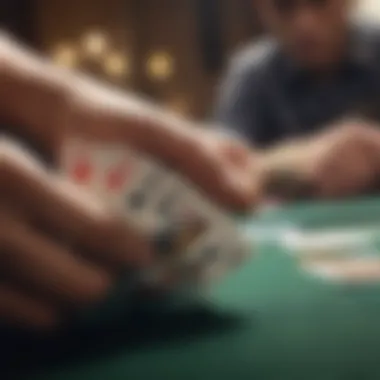Exploring Free Play in Texas Hold'em Poker Strategies


Intro
In the landscape of gaming, free play in Texas Hold'em poker offers an inviting canvas for both seasoned players and eager novices. Engaging in this non-monetary format allows players to explore the intricate strategies and psychological nuances that the game weaves. Here, the stakes are not just chips but the enrichment of skills and understanding that go hand-in-hand with hours spent at the felt. This section sets the stage by laying out key areas of exploration, from essential betting strategies to variations that spice up the gameplay experience.
The game, while seemingly straightforward, possesses layers of complexity that can intimidate new participants. However, whether you’re a casual enthusiast or someone on the verge of pursuing the professional path, the approach to free play can be both educational and entertaining. By striving for a balance between fun and strategic depth, players can effectively hone their game without the fear of financial loss.
As we navigate through the various elements of Hold'em poker, one can expect to uncover vital insights that come alive when money is not part of the equation. We will explore diverse betting strategies, game variations, and delve into the psychological aspects that make this card game a fascinating endeavor for many.
Prelims to Free Texas Hold'em
In the realm of poker, Texas Hold'em stands as one of the most celebrated variants, underscored by a certain unique blend of strategy and chance. Specifically, engaging in free play allows players to navigate the complexities of the game without the looming threat of financial loss. Understanding this introductory facet of free Texas Hold'em not only highlights its significance but also sets the stage for a broader discussion on gameplay mechanics, strategies, and skill development.
The key appeal of free play lies in its accessibility, providing newcomers with a risk-free environment to learn the ropes while allowing seasoned players to refine their tactics. By eliminating monetary stakes, players are liberated from the stress often associated with betting real cash. This aspect fosters a more relaxed atmosphere, encouraging exploration and experimentation with various strategies without harsh financial consequences.
Moreover, the environment nurtures a community of players, as many online platforms facilitate connections among enthusiasts. This communal experience enriches the overall enjoyment and can lead to deeper insights into gameplay dynamics. Whether you are honing your skills for future cash games or simply relishing the challenge, free play offers invaluable lessons and an avenue for personal growth.
As we delve further into the article, we will unpack the numerous dimensions of free Texas Hold'em, covering foundational rules, psychological influences, and strategic enhancements. This knowledge will empower players at all levels to engage with the game more confidently and effectively.
"Free play is not merely a pastime; it's the laboratory for developing skills across the spectrum of poker."
Understanding the Basics of Hold'em
Texas Hold'em presents an intricate dance of tactics, psychology, and probability. At its core, players are dealt two private cards while five community cards are revealed throughout the course of the game. Understanding this combination not only of personal and public information but also how to leverage it to your advantage is central to mastering the game.
In a standard game, players aim to create the best five-card hand possible using any combination of their two cards and the five community cards. Hands are ranked, from highest to lowest, from royal flush down to high card. Knowing these rankings is essential as it lays the foundation for making informed decisions during play.
The dynamics of betting further complicate matters. Players must assess not just their own hand but also the potential strength of their opponents' hands. As the game progresses through various betting rounds—pre-flop, flop, turn, and river—knowledge about the odds and pot size becomes crucial.
An understanding of position at the table also plays a significant role. Players in later positions tend to have more information about their opponents’ actions, which can significantly influence betting strategies.
In free play, you have the opportunity to experiment with these elements at your own pace, which is essential for developing a robust tactical approach. Each game becomes a valuable lesson, equipping you with insights and experiences that will serve well in cash games.
The Appeal of Free Play
The allure of free play in Texas Hold'em cannot be overstated. It creates a welcoming environment for players to experiment fearlessly. One of the prime attractions is the ability to practice without incurring financial setbacks, allowing for mistakes that would otherwise be costly in real-money situations.
For beginners, free play removes the pressure of losing money, enabling them to grasp the rules and intricacies of the game at their own pace. New players can learn the nuances of bluffing, reading opponents, and managing a stack without the daunting shadow of monetary pressure.
Similarly, experienced players can use free environments to test advanced strategies, perfect their timing, and engage in high-stakes bluffing scenarios that may not be feasible at a live table with real money on the line. This practice can be essential when refining overall gameplay.
Furthermore, many platforms offer social interaction during free play, enhancing the gaming experience. Talking with other players, discussing strategies, and even sharing tips can create a more engaging atmosphere than solitary gaming.
The Rules of Texas Hold'em
Understanding the rules of Texas Hold'em is cricital for anyone looking to delve into the world of poker, particularly within a free play setting. The rules serve as the backbone of the game, ensuring a structured and fair environment where players can engage, compete, and hone their strategies without the pressures of real-money stakes.
A firm grasp of these guidelines not only enhances the overall experience but also encourages players to explore various strategic avenues. Clarity in rules breeds confidence, and with that confidence, a player can experiment, learn, and develop their unique style of play.
Game Setup and Structure
To kick things off, let’s talk about the layout of a Texas Hold'em game. The structure is pretty straightforward, yet crucial to the overall experience. The game typically takes place around a circular table, where players sit, ready and waiting to test their skills.
- Blinds: To start every hand, two players are required to post the small blind and big blind. This initial betting creates action and ensures that there is money in the pot from the get-go.
- Dealer Button: A dealer button designates which player acts first in the betting rounds, providing them a strategic position as the game progresses. After each hand, this button rotates clockwise, giving every player the opportunity to take on the dealer's role.
- Card Dealing: Each player is dealt two private cards, known as hole cards, followed by community cards placed face-up on the table. The entire flow of the game revolves around these cards, making their tracking vital for formulating strategies.
Understanding the setup promotes better gameplay during free play, allowing players to focus on strategy rather than feeling lost in the mechanics.
Understanding the Betting Rounds
In Texas Hold'em, the flow of the game is dictated primarily through betting rounds. Each round opens up opportunities for betting, checking, raising, or folding, creating a dynamic environment where both tactics and psychology come into play.
- Pre-Flop: After seeing their hole cards, players must decide whether to call, raise, or fold. This initial phase is all about gauging the strength of one’s hand relative to potential community cards.
- Flop: After the first round of betting, the dealer reveals the first three community cards, known as the flop. Another round of betting ensues, further testing players' resolve and strategy.
- Turn: A fourth community card is added, followed by another betting round. This stage often sees players reassessing their initial bets based on new available information.
- River: The final community card appears, and the last betting round takes place, culminating in the showdown where remaining players reveal their cards.
Understanding these betting structures is essential; they allow players to navigate through a hand strategically rather than simply relying on chance.


Winning Hands and Pitfalls to Avoid
At the end of the day, every poker player dreams of holding the best hand, but the journey there holds as much weight as the outcome. Recognizing winning combinations and being aware of common traps can be a game changer in free play.
Here's a brief rundown of winning hands, ranked from strongest to weakest:
- Royal Flush: The pinnacle of poker hands – A, K, Q, J, 10 all of the same suit.
- Straight Flush: Five consecutive cards of the same suit.
- Four of a Kind: Four cards of the same rank, making for a powerful hand.
- Full House: Three of a kind paired with a pair.
- Flush: Five cards of the same suit, regardless of sequence.
- Straight: Five consecutive cards of any suit.
- Three of a Kind: Three cards of the same rank.
- Two Pair: Two separate pairs in one hand.
- One Pair: A single pair.
- High Card: When none of the above combinations exist, the highest card plays.
While trying to attain these winning hands, players often fall prey to several missteps:
- Overvaluing hands: Just because a hand looks strong, it doesn't mean it is. Being too emotionally attached can lead to poor decisions.
- Forgetting Position: Your place at the table influences your play strategy; neglecting this can leave a player vulnerable.
- Neglecting Opponents' Actions: Failing to read your opponents or consider their betting patterns can lead to lost opportunities.
Remembering these pitfalls while maintaining a keen awareness of winning combinations allows for more strategic thinking during gameplay, making free play not just about luck.
"The greatest mistake is to stay within the limits of your comfort zone. Take risks, learn, and embrace mistakes—they're the stepping stones to mastery."
The Role of Psychology in Poker
In the realm of poker, particularly in free play Texas Hold'em, psychology is not just an accessory; it’s a fundamental structure that shapes the way players engage with the game. Unlike the straightforward mechanics of shuffling cards and placing bets, the psychological aspects add layers of complexity, influencing both individual and collective decision-making at the table. Successful players know that understanding the mindset of opponents is just as crucial as knowing the odds of their hand.
By tapping into the intricate dynamics of psychology, one can gain a significant advantage, setting up scenarios that encourage mistakes from other players. This makes understanding the psychological component not only beneficial but essential for those wishing to excel in poker without financial stakes.
Player Dynamics at the Table
When players assemble around the poker table, each brings their own unique psychological framework. Understanding these dynamics, such as aggressiveness, passivity, and bluffing, can empower a player to navigate the game with finesse. Each player’s personality shapes their betting patterns and reactions, providing valuable insights into their strategies.
- Aggressive Players: Often attempt to dominate the table; they place large bets hoping to intimidate opponents.
- Passive Players: Tend to play conservatively, often waiting to see how others bet before making their moves.
This dynamic creates a swirling mix of strategies. For instance, a player with a calm demeanor may embolden others to make rash decisions, leading to potential mishaps. As they say, knowing the tempo of the table can feel like holding an ace up your sleeve. Using this understanding, one can adjust their tactics, perhaps waiting for those aggressive bets to expose weaknesses or seizing the moment of uncertainty that often strikes passive players.
The Impact of Emotions on Decision Making
Emotions sway decisions more than many realize. In the heat of a game, feelings such as excitement, frustration, or anxiety can cloud judgment, leading to poor choices that can swing the game dramatically. It’s crucial to grasp the emotional state not just of oneself but of others around the table.
An often overlooked aspect of poker psychology is the phenomenon of tilt, which refers to a state of emotional frustration that impairs a player’s ability to make rational decisions. A player who just lost a big hand may find themselves raising their stakes impulsively in a bid to recover their losses, potentially opening up opportunities for others at the table.
It's vital to keep one's own emotions in check and recognise them when they surface. Techniques such as meditation or simple breathing exercises might help maintain composure during high-pressure moments. One should practice mindfulness—being aware of one’s feelings while making strategic decisions, which can effectively prevent tilt and maintain a level-headed approach.
"Poker is not just a game of cards; it’s a fight of wits, where understanding psychology can sometimes be the ace that leads you to victory."
In concluding this section, recognizing psychological roles during gameplay creates a call for skill refinement that transcends mere statistical awareness. By understanding player dynamics and the effects of emotions, a player can elevate their game and enhance their overall experience in free Texas Hold'em.
Strategic Approaches to Free Play
In the realm of free Texas Hold'em, understanding and employing effective strategic approaches can separate the winners from the also-rans. The beauty of free play lies in its ability to allow players to experiment without the looming threat of financial loss. This environment is akin to a blank canvas for painters, where they can test their strokes, arrange their colors, and create ideal compositions. By adopting strategic approaches, players can not only enhance their skills but also grasp how different styles of play can lead to varied outcomes.
The right strategies can optimize gameplay, offer valuable insights into one’s own strengths and weaknesses, and even make the experience more enjoyable. In a game where every decision can alter the ebb and flow of play, having a roadmap becomes essential. Let’s delve into the specific elements that make up these strategic approaches, beginning with the dichotomy of aggressive versus conservative play.
Exploring Aggressive versus Conservative Play
The difference between aggressive and conservative play is as stark as night and day in poker. Aggressive play typically involves betting and raising frequently, allowing a player to take control of the game flow. This approach can apply pressure on opponents, forcing them to make tough decisions. Conversely, conservative play leans towards caution, opting for calculated calls and waiting for prime opportunities to make a move.
A player who masters both strategies learns when to seize the moment and when to pull back. Here are a few considerations during gameplay:
- Aggressive Play Tactics:
- Conservative Play Tactics:
- Bluffing: Feigning strength can lead your opponents to fold when they might have otherwise played against you.
- Taking the Lead: By initiating bets, you dictate the pace of the game, putting you in a dominant position.
- Patience Pays Off: Waiting for the right hands can result in winning more significant pots down the line.
- Bankroll Preservation: This approach can limit losses, ensuring you stay in the game longer, particularly in free play.
Both strategies have their place, but ultimately, the player’s comfort and adaptability will determine their success.
Positioning Within the Game


Position plays a foundational role in shaping a player’s strategy. In poker, your seat at the table can dictate how you approach each hand. The terms “early position” and “late position” refer to where you are seated relative to the dealer, and these positions come with distinct tactical implications.
Early position is where you act first during a betting round. Players here must tread lightly and play tighter hands because they are committing to actions without much information about their opponents’ potential hands. Conversely, late position allows for more aggressive strategies since you can gauge others' actions before making your decisions.
Several positioning tips include:
- In Early Position:
- In Middle Position:
- In Late Position:
- Stick to strong hands, primarily premium pairs or high cards.
- You can slightly widen your range as you have more information but remain cautious.
- Play a more diverse hand range, bluffs become viable, and you can steal blinds more frequently.
Position isn’t merely a by-the-way detail; it's a cornerstone of strategy that transforms how hands are played in free environments or competitive setups.
Adjusting Strategies Based on Opponents
In a game steeped in psychology, understanding your opponents is crucial. Each player brings their own style and tendencies to the table, forming a unique ecosystem. Whether you're facing a cautious player or someone who likes to play wild, adapting your strategies accordingly can enhance your chances of success.
Here are some ways to adjust:
- Observe Trends:
- Identify Patterns:
- Exploit Weaknesses:
- Are they prone to folding under pressure? Bet more often.
- Do they only raise with strong hands? Use this knowledge to call conservatively.
- If they often check-raise, approach with caution when you sense weakness from them.
By attuning to the behavioral nuances at your table, you’re not just playing your own cards; you’re actively engaging with the broader dynamics of the game. This approach is especially vital in free play, where skill-building is at its heart.
"To win at poker, you don’t just play your cards; you play your opponent’s mindset."
The Value of Practice in Free Environments
In the world of poker, practice makes perfect. This saying rings particularly true for free play environments, where players can sharpen their skills without the burden of financial consequences. The opportunity to learn and evolve in a zero-risk setting not only builds confidence but also transforms theoretical knowledge into practical expertise. Engaging in free play provides a unique landscape to experiment with strategies and understand the flow of the game without worrying about losses.
Skill Development Through Free Play
When players engage in free Texas Hold'em, they open the door to substantial skill development. Here’s how this works:
- Trial and error: Players have the freedom to try unconventional strategies or styles of play that they might shy away from in a high-stakes game. For instance, a novice might experiment with bluffing or aggressive betting, discovering what resonates with their personal style.
- Learning from mistakes: Mistakes are bound to happen. In free play, novices can analyze losses and wins alike without the sting of financial impact. A missed call or a poorly timed bluff becomes a learning opportunity, not a costly mistake.
- Simulating high-pressure situations: While free play may lack monetary stakes, it is often populated by players with diverse skill levels, creating a spirited atmosphere that mimics real-life scenarios. This helps players develop resilience and adaptability.
In essence, free play serves as a no-risk training ground where players can cultivate skills that are vital for success in serious gameplay.
Real-Life Application of Skills Acquired
The skills gained during free poker sessions aren’t just useful in an insular environment; they have real-world applications that stretch into competitive play. Here’s why the skills you hone in free play can transition seamlessly into actual game scenarios:
- Solidifying fundamentals: Players who understand the basic mechanics of the game through free play can translate that knowledge into winning strategies when money is involved. Recognizing strong hands or understanding betting patterns becomes second nature.
- Enhancing emotional control: Practicing in a free environment allows players to mirror the emotional aspects of the game. Stress management and staying calm under pressure can easily be rehearsed. Thus, when actual stakes arise, the player is better equipped to handle high-pressure situations without crumbling.
- Building a diverse toolkit: The various strategies developed in free play become part of a player’s repertoire, offering them flexibility in their approach. This ensures they aren’t just relying on one tactic but can adapt to different opponents, elevating their game.
A keen poker player knows that the skills acquired in the friendly confines of free poker and the playful arenas of practice don’t just make them competent; they craft them into formidable opponents capable of facing down the toughest of challenges.
"Practice in a pressure-free environment isn’t just beneficial; it’s essential for grinding out success in competitive poker."
As gamblers, poker players, bet analysts, game strategists, and hobbyists navigate through their poker journey, the road paved by free play will become increasingly valuable, allowing them to hone their skills while enjoying the game itself.
Common Mistakes in Free Hold'em Play
Understanding the common missteps in free Hold'em play is pivotal for any player, irrespective of their experience level. Carving out a successful poker journey often requires us to turn a mirror on our own gameplay, acknowledging where we go awry. The pitfalls discussed here not only serve as warnings but also highlight the areas where keen attention might yield notable improvements.
Every one of us can slip up, and recognizing these trapdoors is essential to evolving into a more strategic player.
Overspending on Bets in Free Games


One of the most frequent blunders in free poker environments is overspending on bets, often fueled by players treating free chips casually. During these games, some might believe that because the stakes are low or nonexistent, they can throw chips around without thought. While this mindset may seem fun in the moment, it can quickly lead to bad habits.
- Lack of Financial Consequence: The absence of real money can lead to a false sense of bravado, where players overcommit themselves recklessly.
- Compromised Learning: Overspending can overshadow the learning experience. Players might focus on winning rather than honing their strategies, ultimately affecting their skill development.
- Misinterpretation of Value: Without the instinctual caution that comes with risk, players may fail to grasp the true value of bets, underestimating how calculated betting works in serious play.
In free games, it’s crucial to practice discipline. For example, when considering a bet, one should reflect on their hand strength, position at the table, and the tendencies of opponents. Playing with a mindset that values every chip, even if they’re not real, sets up a framework that can transition effectively into real-money games.
Neglecting to Adjust Strategies
Another common blunder is sticking rigidly to a strategy regardless of changing dynamics at the table. The beauty of poker, especially free play, lies in its ever-evolving landscape. A savvy player adapts based on their observations and the shifts they see in their opponents’ gameplay. Here are some considerations:
- Reading Opponents: If players notice aggressive tendencies from others, doubling down on a passive strategy can be detrimental. In such cases, adopting a more assertive approach may yield a better outcome.
- Changes in Table Dynamics: Players should be aware of how their own style is perceived by others. Playing too predictably can signal to opponents that they can take advantage of their plays.
- Feedback Loop: Each game provides insight. Neglecting to adjust strategies means missing out on valuable data. Recognizing situations where an opponent has been bluffing or consistently folding can guide future hands.
Adapting is an essential skill in poker. The ability to shift gears based on your insights not only enhances your game but also positions you as a formidable opponent at any table.
"In poker, it’s not just about what cards you hold, but how you hold them against your opponents’ minds."
By steering clear of these oversights - overspending and failing to adjust your approach - players can enrich their experience in free Hold'em and better prepare themselves for future competitive play.
Responsible Gaming Practices
The landscape of free Texas Hold'em poker is rich with opportunity but not without its hazards. Responsible gaming practices are vital to ensure that the enjoyment of the game doesn’t spiral into something harmful. Understanding how to navigate this will enhance both the gaming experience and the player's well-being. In free play, it might be easy to lose track of time or even stakes since money isn't involved. Yet the habits formed here can seep into real-money play if unchecked.
There are several elements that underscore the importance of responsible gaming practices:
- Awareness of Behavior: The best players keep a finger on the pulse of their own emotions and behaviors. Recognizing when the game turns from enjoyable to compulsive can save a lot of trouble down the line.
- Healthier Choices: By engaging in responsible gaming, players can foster habits that promote better decision-making, both in and out of the poker room. Skills you develop in managing your gaming time can translate to other areas of life.
- Community Support: Many poker platforms offer resources and forums where players can share their experiences, fostering a supportive environment for those who need it. Engaging in these communities can reinforce positive gaming habits.
“A savvy player is not just one with good tactics, but also one who knows when to fold, step back, and reflect.”
Recognizing Signs of Problem Behavior
It’s essential to know when gaming might become problematic. There are some indicators that one might be crossing a line:
- Losing Track of Time: If you’ve found yourself saying, "I'll just play one more hand," for hours on end, it may be time to reevaluate. Playing for extended periods can lead to fatigue and poor decision-making.
- Emotional Reactions: If you start feeling anger, frustration, or sadness when you lose—especially in free play—this can hint at a deeper issue. The game should be a source of enjoyment, not emotional distress.
- Withdrawal from Responsibilities: Overshadowing other aspects of life for poker can signal a problematic relationship with the game. Missed work deadlines, neglected relationships, or other life responsibilities can serve as red flags.
Recognizing these signs early can help prevent escalation into a more serious gaming issue.
Setting Personal Limits
Just like any other form of entertainment, setting limits is a smart way to maintain a healthy gaming lifestyle. Here are a few strategies:
- Time Limits: Set strict boundaries on how long you intend to play. For instance, if you're playing at 7 PM, decide that you'll stop at 9 PM, and stick to it.
- Session Goals: Play with specific objectives in mind. This could mean aiming to play a set number of hands or practicing a particular strategy. Once you hit that goal, walk away.
- Take Regular Breaks: Emphasize the importance of breaks. Sometimes stepping away for a few minutes helps reset your focus and decision-making ability.
Implementing these strategies can help keep the gaming experience enjoyable and sustainable. When players are equipped with personal limits, they’re more likely to enjoy the game without the risk of tipping into problematic behaviors.
By emphasizing responsible gaming practices, players set themselves up for a more successful journey in free Texas Hold'em poker.
The Future of Free Poker Games
As the digital landscape continues to shift and transform, the realm of free poker games is keeping pace. This section highlights what's on the horizon for players seeking entertainment and skill enhancement without the monetary stakes typically associated with poker. It sheds light on critical aspects like innovation in online poker platforms and how player preferences are evolving. By understanding these trends, players can prepare themselves for the next wave of developments in the gaming world, allowing them to sharpen their skills and enjoy poker in new and engaging ways.
Innovations in Online Poker Platforms
The growth of technology has significantly altered how poker is played. Online poker platforms are increasingly incorporating innovative features designed to enhance user experience. For instance, augmented reality is making waves, enabling players to immerse themselves in a more interactive environment. This technology allows users to visualize the cards and gameplay in a 3D space, creating an atmosphere reminiscent of a real casino.
Furthermore, live dealer options are also gaining popularity. These formats blend digital and tactile experiences, where players interact with real dealers streaming in real time. This not only adds a layer of authenticity but also nurtures a sense of community, often lacking in traditional online settings.
On the technical side, advancements in artificial intelligence are also shaping the future of free play. AI is being used to tailor experiences to individual players, analyzing their moves and suggesting strategies. This personalized approach could modify how players sharpen their skills during free play, turning learning into an engaging experience.
"The essential aspect of technology in poker is its capacity to bridge the gap between leisure and learning."
These innovations are geared toward making free hold'em environments more conducive for practice and growth. They create opportunities for players to take risks and experiment with strategies without the pressure of financial repercussions.
Evolving Trends in Player Preferences
As the poker landscape evolves, so too do the preferences of its enthusiasts. Players are increasingly gravitating toward formats that emphasize community and interaction. While traditional solo online games have their charm, many players are now drawn to multiplayer environments where they can share experiences and engage with others.
Mobile gaming has also risen to prominence. The convenience of playing on-the-go attracts new players looking for quick entertainment. Players appreciate the ability to join free games and tournaments at their leisure, fostering a spontaneous poker culture.
Moreover, there's a growing emphasis on social responsibility within the gaming community. Many new players are drawn to platforms that promote responsible gaming practices, ensuring that the fun doesn't spiral into obligation. This shift is seen as a necessary step in balancing enjoyment with mindful participation.







